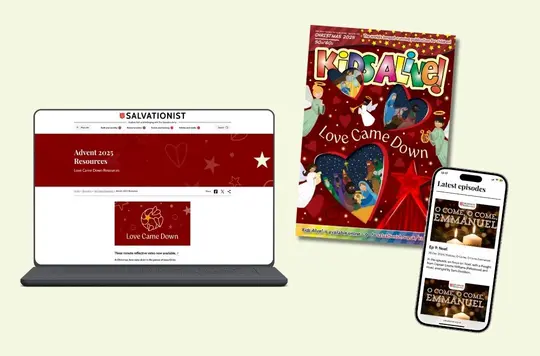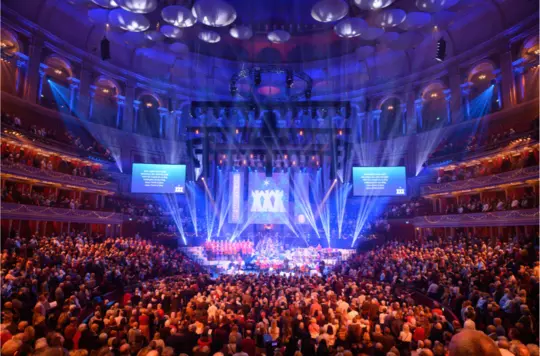28 November 2025
A reflection on Love Came Down at Christmas
Lieut-Colonel Jayne Roberts

At the start of Advent, Lieut-Colonel Jayne Roberts reflects on the difference God’s love makes in our lives and the world.
Christina Rossetti’s ‘Love Came Down at Christmas’ is a beautiful poem that captures the heart of the Christian message. In just 12 lines the poet distils a theology of the Incarnation, worship and Christian living.
She declares that love is present, in our world, embodied and transformative.
‘Love Came Down at Christmas’ invites us to consider how God’s love transforms our inner lives and the communities in which we live. As we reflect on her words may we remember not only what Christmas celebrates, but also what a difference God’s love makes in a world longing for hope and healing.
The descent of love
The poem speaks of God taking on human flesh in the person of Jesus Christ. The repetition of ‘love’ emphasises that the very essence of God is love, and that this love did not stay distant.
Instead, Love came down, choosing humility and vulnerability.
Years after Christina Rossetti, another poet, John Gowans, said: ‘God is hidden no more/He has spoken his mind,/Wrapped the gift of his love in the stuff of mankind.’ How wonderful that God chose to communicate his love in the irresistible form of a human child!
In verse one of Rossetti’s poem, ‘star and angels gave the sign’ echoes the narratives in the Gospels of Luke and Matthew. The heavenly realm breaks into the earthly to announce that something world-changing has happened.
The sign of the angels was given to ordinary people, the shepherds caring for their precious flocks on the hills of Bethlehem. God’s glory was revealed to lowly men and their response was to seek the Messiah and worship him.
The sign of the star was noticed by men who hadspent years studying and watching the heavens. They, too, responded by travelling, seeking to understand that sign. They, too, found the newborn King – Love come down in the person of Jesus Christ.
What a difference God’s love can make within the human heart. To know that Love has come down for us is to know that we are cherished and held.
Many people live with a sense of loneliness or insignificance, but Rossetti’s words counter this by showing that God’s love actively enters our world and our lives. When we embrace this truth, our priorities begin to shift.
We realise that worth is not measured by achievement or status but by the love of God who draws near to us.
Worshipping Love Incarnate
The second verse begins: ‘Worship we the Godhead,/ Love Incarnate, Love Divine.’ Rossetti moves from proclamation to worship, from what God has done to our human response. Worship, for Rossetti, is the recognition that God’s love is embodied in Jesus Christ.
By calling Jesus ‘Love Incarnate’, she shows that worship is rooted in relationship rather than obligation. We worship Christ not because we are commanded to, but because divine love has been revealed to us in a way we can see, touch and follow.
The final question in the stanza – ‘but wherewith for sacred sign?’ – asks how such love should be expressed. How do we show our devotion to the God who has given everything for us? This takes us beyond private devotion and into the realm of daily life.
Worship becomes not just something we do in a church service, but a pattern of living that reflects Christ’s compassion, humility and mercy. This stanza helps us understand the communal impact of God’s love. When we worship Love Incarnate, we begin to imitate him.
Christ’s earthly life was one of reaching out to the excluded, forgiving the sinner, feeding the hungry and healing the broken. Communities shaped by worship of Jesus inevitably become communities shaped by his way of love.
God’s love then forms the foundation for how we relate to one another, how we forgive, and how we seek justice and reconciliation.
The token of Christian life
In the final verse, Rossetti writes ‘love shall be our token’, which answers the question posed in the second. The sacred sign of our devotion is love – love given, received and shared. This love is the guiding principle of Christian community and our Salvation Army statement of intention: love God, love others.
The use of the word ‘token’ is significant: a token is a sign, a visible marker. For Christians, love is the identifier. Jesus taught this when he said, ‘By this everyone will know that you are my disciples, if you love one another’ (John 13:35).
Rossetti echoes this teaching, suggesting that love is not only the gift we receive from God but also the gift we give to the world.
Here is the communal outworking of divine love. When God’s love fills our lives, it does not remain confined to us. It expands outward, shaping relationships, healing divisions, and inspiring acts of generosity and courage.
In a world so often marked by conflict, competition and isolation, love becomes a radical force. Rossetti’s vision challenges us to live in a way that reflects the Incarnation – bringing God’s love into every interaction, every decision, every community we inhabit.
The difference God’s love makes
Notice the progression as you read through this lovely poem: God’s love descends, we respond in worship, and love then becomes the guiding sign of our lives. This movement reflects the Christian journey each of us can make during this Advent season.
We are invited to encounter God’s love, to be transformed by it, and to carry it into our neighbourhood.
Communities shaped by this love are places where people are valued not for what they produce but for who they are. They are places where forgiveness is possible, where burdens are shared, and where hope is nurtured. God’s love empowers people to act with courage and compassion, even in the face of injustice or suffering.
This year’s Advent theme of Love Came Down invites us not only to wonder at divine love but to participate in its ongoing work of transformation.
When Love came down at Christmas, the world was changed for ever. And when that same love is lived out just where we are, the world continues to be changed – one act of kindness, mercy and justice at a time.
Written by

Lieut-Colonel Jayne Roberts
Discover more

As we move through Advent and prepare to celebrate Christmas, we also look ahead to what’s coming up.

Our annual carol concert at the Royal Albert Hall – recording for 2025 now available.

Worship resources to help congregations explore the theme of Love Came Down this Advent.

A podcast of reflections for Advent inspired by Christmas carols.